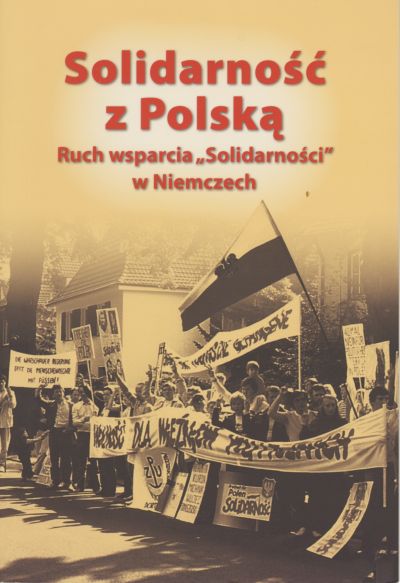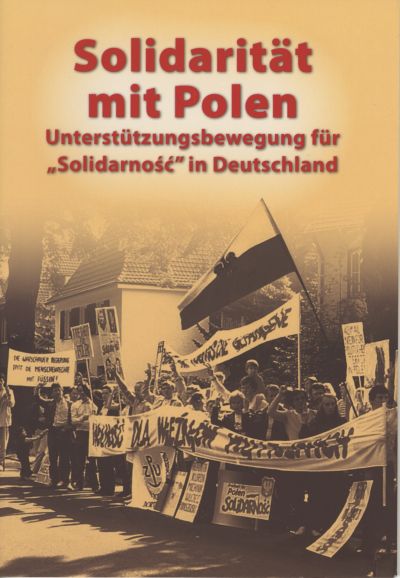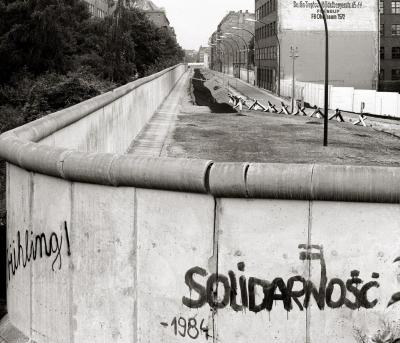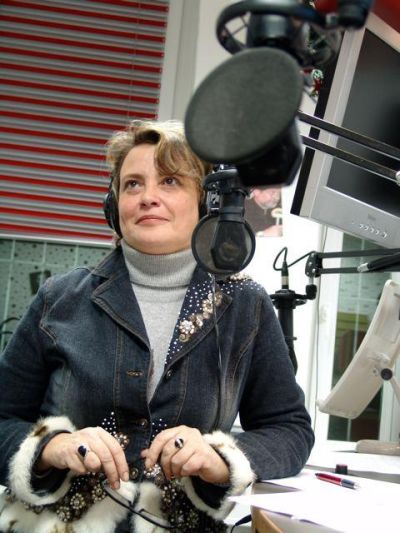The pro-Solidarność movement in Germany

In 1983, the Towarzystwo “Solidarność” – “Solidarność” Association emerged from the informal Committee for the Defence of [the Trade Union] “Solidarność” (Komitet Obrony Solidarności, (KOS)) in West Berlin. The co-founder and chair of this organisation, which, just like the KOS, was predominantly there to assist Solidarność activists who had been persecuted under martial law, was Edward Klimczak. Another role of the organisation was to provide German society and Poles living in the West with information about the situation in the country. The people in the Polish underground were supported with smuggled printers, printing accessories, listening devices, radios and televisions. Books and other printed matter in very small print runs, as well as literature in Russian and Ukrainian, were also smuggled over the border. Kazimierz Michalczyk organised the transport for Solidarność Walcząca in the east of the country, whilst Leszek Kaleta supplied the Wrocław branch. The “Solidarność” society, as an arm of the CSSO, also hosted the annual meeting in West Berlin. At the beginning, the KOS published a “Biuletyn Informacyjny” (“Information Bulletin”) every two weeks, which was later followed by the magazine “Pogląd” (“Opinion”), which had been published in German every three months since 1983. From 1985, “Pogląd” was also sent to Poland in a small format.
The “Solidarność” working group Cologne was created in 1982. Because the Embassy of the People’s Republic of Poland was located in Cologne, this association played an important role in arranging the formalities relating to the frequent protests and demonstrations which it held with other organisations to support the “Solidarność” trade union. In the hands of the SWG Cologne, these events included marches through the city (13 December 1983), rallies in front of institutions of the People’s Republic of Poland (13 May 1988), hunger strikes (24 December 1981 and 6 May 1985), celebrations for memorial days (1 October 1984), fundraising activities, information stands and petitions (1 May 1982). One spectacular initiative, which happened during the week of 6 to 13 May 1985, was a hunger strike for the release of the Solidarność members Andrzej Gwiazda, Władysław Frasyniuk, Bogdan Lis and Adam Michnik, who had been sentenced to long prison terms, for the leaders of the Confederation of an Independent Poland (Konfederacja Polski Niepodległej (KPN)) with Leszek Moczulski at the helm, and against the persecution of the Catholic church and its priests. There were similar initiatives in Brussels, Paris, London, Vienna, Manchester, Oslo and Chicago. The heads of the Cologne group were Jerzy Lisiecki, Stanisław Wolnik, Krzysztof Chorosiński, Marek Poliwski, Stanisław Cegliński and Dorota Leszczyńska.
The “Solidarność” Working Group Eschweiler – Aachen first emerged in August 1982 after making contact with the Solidarność office in Bremen and the SWG West Berlin. It was mainly involved in acquiring and transporting medicine as well as humanitarian aid. As the group gained more and more sympathisers in Aachen over time, it began to operate under the name Eschweiler – Aachen. In the mid-1980s, with branches in Düren, Monheim and Bonn, it had over 150 members.
This association also provided Germans and Poles with information and organised three of the exhibitions dedicated to Solidarność. The first was held in Eschweiler town hall, the second in Aachen Municipal Library and the third, to mark the tenth anniversary of Solidarność, in the Kulturhaus Barockfabrik in Aachen. The group also handed out leaflets, was involved in editing the monthly magazine “Przekazy”, which appeared in Berlin, distributed the “Information Bulletin” and underground press from Poland, and set up information stands. From 1983, it was almost always involved in organising demonstrations in front of the Polish Embassy in Cologne and also took part in protests held by other independence organisations, like the Christian Ministry for the Liberation of the People (Chrześcijańska Służba Wyzwolenia Narodów (ChSWN)), the Association of Polish Refugees (Zjednoczenie Polskich Uchodźców (ZPU)) or the “POMOST” association (The Bridge). The SWG Eschweiler – Aachen also cooperated with other Solidarność supporter groups in West Germany, such as the “Solidarność” aid committee in Mainz, the SWG in Cologne, Munich and West Berlin and the “Solidarność” society in Berlin. In 1986, the group approached the CSSO organisations. It was admitted in 1987 on the occasion of the congress in London. Within the framework of the CSSO, the group took over the patronage of the “company” publications in Poland, among other things. In addition, in 1988 and 1990 it also organised CSSO meetings, latterly on the occasion of the tenth anniversary of the August protests in Poland. The assistance given to the democratic opposition and the underground Solidarność in Poland were coordinated on a regional basis by Ryszard Wyżga for West Pomerania, by Jerzy Szczepański for Central and Eastern Poland and by Wojciech Gawron for the foothills of the Beskydy Mountains. Aleksander Zając organised the aid for Solidarność Walcząca. Bogusław Teodorowski and Mieczysław Zarzyczny were responsible for Silesia. Wojciech Gawron und Aleksander Zając, as representatives of the Academic Information Centre (Centrum Informacji Akademickiej (CIA) of the NZS, supported the Independent Association of Students (Niezależne Zrzeszenie Studentów (NZS) in the West. Technical equipment was smuggled into Poland by Andrzej Wirga of the “Solidarność” aid committee in Mainz and by Józef Lebenbaum from the IPA (Independent Polish Agency) in Lund in Sweden. The SWG Eschweiler – Aachen supported the underground publishing houses, which were operating in Central and Eastern Poland, in West Pomerania and in the Beskydy foothills, as well as the publishing houses of the NSZ student associations in Kraków and Warsaw. Striking members of Solidarność were also given financial aid. There were cooperations with the Academic Information Centre in Warsaw and with the Solidarność Walcząca. The following media were supported: “CIA – Serwis Informacyjny NZS” (Information bulletin of the association of students), “Solidarność Podbeskidzia” (Beskydy foothills), “Z Dnia Na Dzień” (Lower Silesia), “Solidarność Walcząca”, “INDEKS” (Kraków), “BIULETYN” (Association of Students at the Business Academy in Kraków), “Na Bieżąco” in Opole, “Jedność” (West Pomerania), “Obraz” in Szczecin, Tygodnik Wojenny and the citizens’ committees in Tychy and in Bielsko-Biała.




